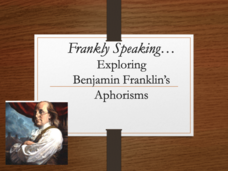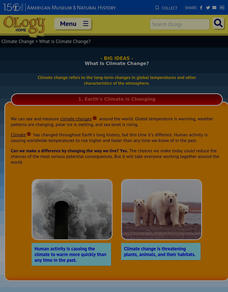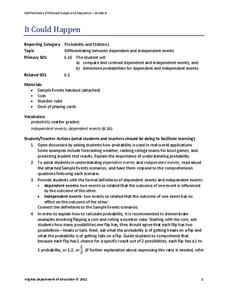Global Oneness Project
Living with Less Water
Did you know that California produces two thirds of the fruits and nuts consumed in the United States? That it produces almost one third of the vegetables? Did you know that scientists warn that California is facing the onset of a...
Core Knowledge Foundation
A Time for All Seasons - Spring
Celebrate the arrival of spring with this fun primary grade science unit. Engaging young scientists with a variety of hands-on activities and inquiry-based investigations, these lessons are a great way to teach children about seasonal...
American Chemical Society
What Makes It Snow?
Discover the icy world of snow from the comfort of the indoors. Young meteorologists study visuals and a video to examine snow formation and structure. Using the information they learn, scientists follow a procedure to construct a...
American Chemical Society
What is Wind?
Engage creative minds with an exciting activity about the power of wind. Investigators participate in class discussions while viewing images and animations of air and wind. Scholars test the relationship between wind speed and an...
American Chemical Society
Keeping Warm in the Cold
Bundle up to stay warm! A fun-filled investigation opens with a group discussion about heat loss and using materials to prevent it. Young scientists then view an animation about thermometers and the Celsius scale and practice reading...
American Chemical Society
What Makes it Rain?
Clouds come alive when curious minds create rain in an action-packed activity. Scholars view a video of rain and analyze an image of water uses to generate a class discussion leading into a hands-on exploration. Using a set of...
American Chemical Society
Why Do Puddles Dry Up?
Bring evaporation right into the hands of young scientists with an entertaining, hands-on activity. Investigators view videos and images while participating in class dialogue focused on water evaporating from surfaces. A short experiment...
NASA
Comparing Temperature and Solar Radiation for Common Latitudes
There's snow much to learn! Excited individuals use real-world data to discover how latitude affects the odds of a snow day. Scientists compare latitude, solar radiation, and temperature using NASA data for several locations....
Chandler Unified School District
Frankly Speaking: Exploring Benjamin Franklin's Aphorisms
Benjamin Franklin famously had an aphorism for every situation—most of which we still use in modern vernacular. Introduce class members to Franklin's Poor Richard's Almanack with a presentation that details the characteristics of aphorisms.
K12 Reader
Meteorologists
Meteorologists and the tools they use are the subject of a reading comprehension learning exercise that asks kids to read the attached article and respond to a series of comprehension questions.
Calculated Industries
Army Survival
Intended as a reference tool for US Army personnel, this application can be used in a classroom that is studying historic and current wars or as part of an outdoor education or wilderness survival course. Some of the subjects addressed...
Teach Engineering
Hurricanes
When a levee fails, it means disaster. Introduce your class to hurricanes and the technologies used to help protect against them. The included presentation provides background information using Hurricane Katrina as a reference.
NOAA
El Niño
El Nino, La Nina ... and the Santa Maria? The 11th installment of a 23-part NOAA Enrichment in Marine sciences and Oceanography (NEMO) program explains the mechanism of El Nino/Southern Oscillation. Pupils use previous data to determine...
Savvas Learning
Verbs: Future
As part of their study of future tense verbs, language learners engage in activities, read fables, and sing songs. The 25-page packet includes detailed lessons, worksheets, graphic organizers, and answer keys for assessments.
Weebly
Ancient China
From China's physical geography and earliest beginnings of civilization to the Qin and Han dynasties, here is a nicely designed worksheet on ancient China, which includes a graphic organizer and timeline to summarize the reading material.
Global Oneness Project
Witnessing Icebergs
Camille Seaman's photoessay, "Witnessing Icebergs" documents just a tip of the problem of climate change through images of icebergs in both the Arctic and Antarctic polar regions. After viewing the haunting images, viewers respond to a...
EngageNY
Chance Experiments
Class members are introduced to probability using terms such as impossible, unlikely, likely, and certain. Numbers between zero and one are associated with the descriptions of probability. Pupils find the likelihood of chance experiments...
American Museum of Natural History
What Is Climate Change?
So many factors show that climate change has arrived. Learners read through an online resource that explains the data and the consequences of climate change. They also review strategies for slowing or even reversing the global influence.
NASA
Erosion and Landslides
A professional-quality PowerPoint, which includes links to footage of actual landslides in action, opens this moving lesson. Viewers learn what conditions lead to erosion and land giving way. They simulate landslides with a variety of...
NNF
Floods Happen
Did you know that flooding is the most common natural disaster in the United States? Prepare your learners with the facts about floods and offer them the proper knowledge and tools for dealing with this type of emergency.
Virginia Department of Education
It Could Happen
Understanding of probability will probably increase with the use of a refined resource. Pupils learn to distinguish between dependent and independent events as they calculate the probabilities of these types of events in various situations.
Other popular searches
- Weather Reporter
- Extreme Weather Book Reports
- Severe Weather Reports
- Extreme Weather Reports
- Weather Reporter Careers
- Weather Reports
- Esl Weather Lessons Report
- Reporting the Weather
- Weather Forecast Report
- Newspaper Weather Reports
- Anchor Reporter Weather News
- Weather Reporting






















